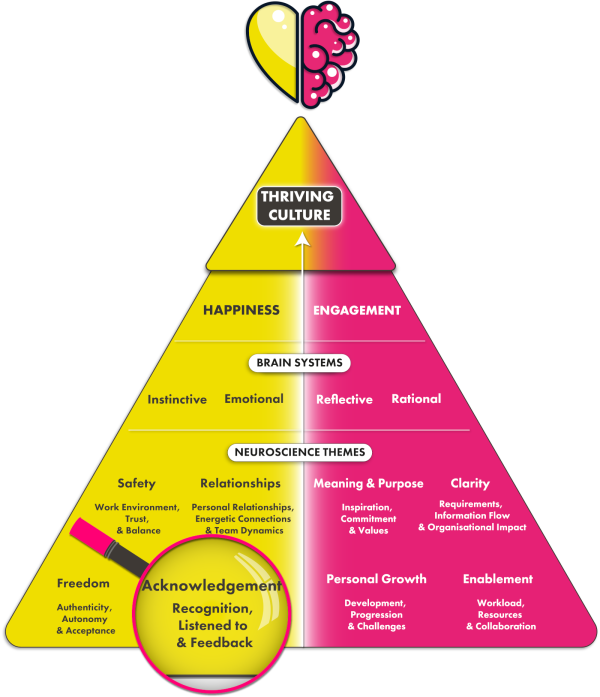Menu


Feeling listened to is a key part of acknowledgement, which helps drive our happiness. This is linked to the Emotional brain system in our neuroscience model.
If you’ve just landed on this page, we recommend reading our introduction to brain systems and the neuroscience themes for more context. Otherwise, read on for everything you need to know about how feeling listened to drives employee happiness and why it is so important in the workplace.

Acknowledgment could be the key to keeping your team happy and engaged. It costs nothing, takes just minutes and goes a long way to making people feel more human. Knowing that we’ve been heard, that our voice has been given space and our efforts have been recognised.
Acknowledgment doesn’t necessarily translate into action, but it means our feelings, opinions and thoughts are taken into account rather than being dismissed or ignored. It is a process of observing and understanding, but as with any process, it takes intention to implement.

When we think about acknowledgment from the employee recognition point, it’s as simple as knowing someone’s name and interacting with them as much as you can at the moment. This lets them know they have been acknowledged. Because it is soul-destroying when people just walk past without a single look. Acknowledgment really is just being human.
Listening is vital because we think we know what our employees want, but that isn’t always the case. Most organisations are well-intentioned, particularly regarding health, safety and psychological safety. But even when we set up the right standards for our people, we still don’t always understand our own bias. We’re still not really aware enough of the things that can stop us. It’s really important to listen to people, ask for their feedback and say, “I heard what you said.” You may not be able to do anything about it, but the act of listening can bring a sense of inclusion and belonging.
People become disengaged and don’t feel included when they are not heard. As an organisation you may roll out a policy or project, but it’s flawed if you fail to get employee input. People will not feel connected with the initiative because they weren’t engaged in the development process.
It’s a bit like the Kubler-Ross Model of Grief. First, you feel agitated, then annoyed and maybe, in the end, acceptance. But acceptance doesn’t always mean happiness – sometimes, it’s just surrendering to the inevitable. There are many downsides if we fail to listen to our employees, so it’s important to be conscious of this.
When you receive feedback, try to understand where the common threads exist. Is the feedback coming from one person or ten people? It is around one project or many? Measurement will give you insight into the common threads to focus on. Then go back to those that gave feedback, acknowledge what they’ve said, explain what you’ve done with the feedback and what you intend to do moving forward. And ask for more feedback on that.
It’s not wise to totally ignore feedback. Obviously, if people are coming back with stuff that isn’t perhaps healthy or valid, then you’ve got to be careful not to give it space. There’s a balance in appropriately handling feedback and acknowledgment. Simplicity is expensive because you’ve got to respond in a way that simplifies the key message. This takes time and practice to take all the complexity involved and weave it in a way that people can feel heard.
**This is an excerpt from the Happiness and Humans Podcast with Margot Slattery, the Global Head of Diversity, Inclusion & Belonging at ISS A/S at ISS A/S CDir. Listen to the full podcast here.
Related articles
Get in touch for a quick chat with one of our experts to see how we can help you.
Take our benchmark to map where your organisation is now, and where it needs to be.